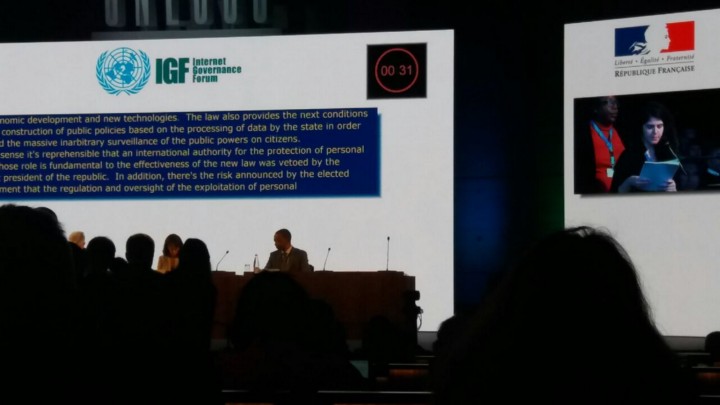Por ocasião do Fórum de Governança da Internet de 2018, ocorrido nos dias 12 a 14 de novembro em Paris, a Coalizão Direitos na Rede vem manifestar sua posição em relação aos riscos que correm as políticas de Internet no Brasil com a perspectiva do governo Bolsonaro. O Brasil conquistou importantes avanços nos últimos anos nos campos da liberdade de expressão, acesso à informação e no gerenciamento democrático das comunicações através da governança multissetorial da Internet que devem ser assegurados frente as ameaças eminentes que estão por vir. O Marco Civil da Internet (Lei 12.965/2014), a Lei Geral de Proteção de Dados (Lei 13.709/2018) e as políticas de expansão do acesso e da conectividade são referências dessas conquistas.
Elas garantiram ao Brasil uma posição de destaque e reconhecimento internacional no que diz respeito à cooperação entre setor público, empresarial, acadêmico e sociedade civil para a governança multissetorial, que vem sendo determinante para o desenvolvimento da Internet no país, equilibrando as demandas de diferentes grupos da sociedade.
O Marco Civil da Internet foi fruto dessa cooperação multissetorial, e estabeleceu princípios, garantias, direitos e deveres celebrados internacionalmente, sendo hoje referência para o mundo.
Outro esforço que também envolveu uma articulação positiva entre estes diversos setores foi a aprovação da Lei Geral de Proteção de Dados Pessoais em sintonia com a GDPR europeia de modo a garantir políticas de privacidade e acesso, conferindo segurança jurídica para o desenvolvimento econômico e de novas tecnologias. A lei também oferece as condições necessárias para a construção de políticas públicas baseadas no tratamento de dados por parte do Estado de modo a evitar a vigilância massiva e arbitrária do poder público perante os cidadãos e cidadãs. Nesse sentido, é reprovável o fato de que uma Autoridade Nacional de Proteção de Dados Pessoais, cujo papel é fundamental para a efetividade da nova lei, foi vetada pelo atual Presidente da República. Ademais, há o risco anunciado pelo governo eleito, de que a regulação e fiscalização da exploração de dados pessoais no Brasil serão submetidas a organismo de caráter militar como a Agência Brasileira de Inteligência, o que compromete as liberdades democráticas.

O momento atual também requer atenção especial à garantia da segurança das comunicações e das liberdades individuais e coletivas com a participação democrática dos diversos setores a fim de viabilizar seu controle social. A privacidade é central para isso e medidas concretas devem ser adotadas visando a proteção dos dados armazenados nos âmbitos público e privado pela adoção e promoção de tecnologias seguras e da defesa da criptografia.
É imprescindível, por fim, fortalecer as instituições que trabalharam com essas políticas, garantindo os avanços citados acima e a construção democrática das políticas de Internet, especialmente o Comitê Gestor da Internet no Brasil (CGI.br), a Rede Nacional de Ensino e Pesquisa (RNP) e universidades e centros de pesquisa de caráter público que contribuem no desenvolvimento e soberania da infraestrutura e da Internet no Brasil.
Nesse sentido, a Coalizão Direitos na rede denuncia a gravidade das práticas adotadas em propagandas eleitorais que envolvem as plataformas de Internet que dominam o mercado de redes sociais. O WhatsApp, por exemplo, serviu a interesses políticos que influenciaram o cenário das eleições com sérias violações a Lei Eleitoral.
Por todas essas razões as entidades membras da Coalizão Direitos na Rede procuram com essa carta mobilizar a solidariedade internacional em torno da defesa dos direitos digitais no Brasil. Não há espaço na governança da Internet para medidas antidemocráticas.
Internet Governance Forum 2018
Coalizão Direitos na Rede — Brasil
Versão em EN
Open letter in defense of the Internet in Brazil
On the occasion of the Internet Governance Forum of 2018, held on November 12th to 14th in Paris, the Network Rights Coalition wishes to declare its position regarding the risks that Internet policies in Brazil may confront with the perspective of the Bolsonaro government. Brazil has made significant progress in recent years in the fields of freedom of expression, access to information and democratic management of communications through multistakeholder Internet governance, which must be ensured in the face of emerging threats. The Internet Civil Rights Framework (Law 12.965 / 2014, “Marco Civil da Internet”), the General Law on Data Protection (Law 13709/2018) and policies for expanding access
and connectivity are references to these achievements.
They have given Brazil a prominent position and international recognition regarding cooperation between public sector, business, academia and civil society for multistakeholder governance, which has been determinant for the development of the Internet in the country, balancing the demands of different groups of society. The Civil Rights Framework was the fruit of this pluralist cooperation, establishing internationally agreed principles, guarantees, rights and duties, and is now a reference to the world.
Another effort that also involved a positive articulation between these various sectors was the approval of the General Law of Protection of Personal Data, in line with the European GDPR, in order to guarantee privacy and access policies, providing legal security for economic development and new technologies . The law also provides the necessary
conditions for the construction of public policies based on the processing of data by the State in order to avoid the massive and arbitrary surveillance of the public powers on citizens.
In this sense, it is reprehensible that a National Authority for the Protection of Personal Data, whose role is fundamental to the effectiveness of the new law, was vetoed by the current President of the Republic. In addition, there is the risk, announced by the elected government, that the regulation and oversight of the exploitation of personal data in Brazil will be submitted to a military body such as the Brazilian Intelligence Agency, which compromises democratic freedoms.
The current moment also requires special attention to ensure the security of communications and individual and collective freedoms, with the democratic participation of the various sectors, in order to enable their social control. Privacy is central to this and concrete measures must be taken to protect the data stored in the public and private spheres by the adoption and promotion of secure technologies and the defense of cryptography.
It is essential, lastly, to strengthen the institutions that have worked with these policies, guaranteeing the advances mentioned above and the democratic construction of Internet policies, especially the Internet Steering Committee in Brazil (CGI.br), the National Education and Research Network (RNP) and universities and public research centers that
contribute to the development and sovereignty of infrastructure and the Internet in Brazil.
In this sense, the Network Rights Coalition denounces the seriousness of the practices adopted in electoral propaganda that involve Internet platforms which dominate the social networking market. WhatsApp, for example, served political interests that influenced the election scenario with serious violations of the Electoral Law.
For all these reasons, the member organizations of the Network Rights Coalition seek with this letter to mobilize international solidarity around the defense of digital rights in Brazil. There is no room in Internet governance for antidemocratic measures.
Internet Governance Forum 2018
Network Rights Coalition — Brazil

